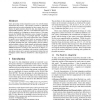Free Online Productivity Tools
i2Speak
i2Symbol
i2OCR
iTex2Img
iWeb2Print
iWeb2Shot
i2Type
iPdf2Split
iPdf2Merge
i2Bopomofo
i2Arabic
i2Style
i2Image
i2PDF
iLatex2Rtf
Sci2ools
107
click to vote
SIGMOD
1999
ACM
1999
ACM
An Adaptive Query Execution System for Data Integration
Query processing in data integration occurs over network-bound, autonomous data sources. This requires extensions to traditional optimization and execution techniques for three reasons: there is an absence of quality statistics about the data, data transfer rates are unpredictable and bursty, and slow or unavailable data sources can often be replaced by overlapping or mirrored sources. This paper presents the Tukwila data integration system, designed to support adaptivity at its core using a two-pronged approach. Interleaved planning and execution with partial optimization allows Tukwila to quickly recover from decisions based on inaccurate estimates. During execution, Tukwila uses adaptive query operators such as the double pipelined hash join, which produces answers quickly, and the dynamic collector, which robustly and efficiently computes unions across overlapping data sources. We demonstrate that the Tukwila architecture extends previous innovations in adaptive execution (such a...
Related Content
| Added | 03 Aug 2010 |
| Updated | 03 Aug 2010 |
| Type | Conference |
| Year | 1999 |
| Where | SIGMOD |
| Authors | Zachary G. Ives, Daniela Florescu, Marc Friedman, Alon Y. Levy, Daniel S. Weld |
Comments (0)

